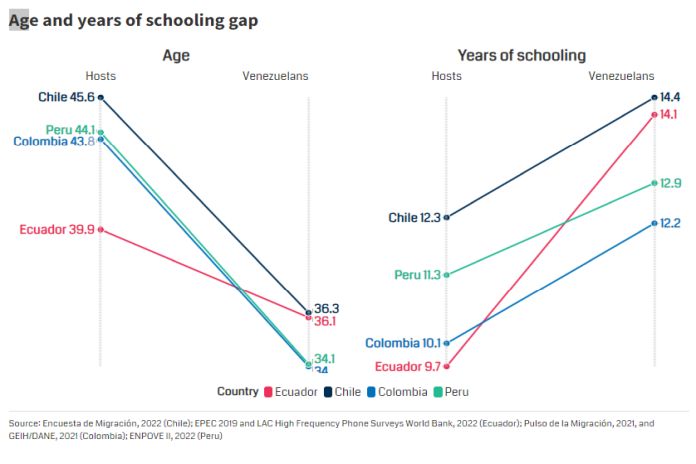David is a computer engineer who arrived in Ecuador in 2018 after being forced to leave Venezuela. Due to the lack of regular documentation, he could not find a job related to his profession, so he learned carpentry instead. He now works with Alexander, who is an Ecuadorian carpenter. “People from Venezuela can support Ecuador. Many of us are professionals in different areas, and we can help this country progress together with Ecuadorians,” says David.
David is one of the 7.7 million Venezuelans who have emigrated in recent years. Close to 80 percent are now in countries in Latin America, mainly Colombia, Ecuador, Peru, Chile, and Brazil, where they can make significant contributions to the local economies. The Venezuelan exodus is currently one of the world’s largest human movements and the largest for a country not at war, and there are no signs that it will reverse any time soon.
The magnitude of Venezuelan migration can bring economic benefits of similar proportions. Venezuelans are likely to raise Gross Domestic Product (GDP) growth in Chile, Colombia, Ecuador, and Peru by an average of 0.15–0.30 percentage points annually between 2017 and 2030. Migration of any scale can yield benefits to the host countries by increasing the supply of labor (particularly in sectors where it is scarce), expanding the skills of the workforce, and providing a larger tax base.
Potential benefits of migration to host countries
- Increased labor supply (particularly in sectors where labor is scarce), a more skilled workforce, and a larger tax revenue (larger tax base).
- Increased economic productivity, particularly when migrants can work at the level of their skills and abilities.
- Potential positive effects on economic growth, thanks to additional labor supply and a boost in demand.
When managed correctly, migration flows can bring benefits to host communities and countries. This depends upon the policy and institutional arrangements in place. Host countries should respond with medium- and long-term approaches to ensure these benefits are realized.
A development opportunity – Venezuelan migration in Chile, Colombia, Ecuador and Peru, a report funded by the Joint Data Center on Forced Displacement, examines the socioeconomic situation of Venezuelans in the four main hosting countries, while comparing their profile to that of host communities. Based on data gathered in each country, the report provides a socioeconomic characterization of this population and suggests how to support their socio-economic integration and development.
Venezuelans travel as families – 47 percent in Chile, 65 percent in Colombia and 57 percent in Ecuador. This makes the provision of early childhood development services and basic services, such as education and healthcare, a challenge. The additional demand exerts pressure on the provision of these services, particularly in the areas where migrants are concentrated. However, the increased economic activity and expansion of the tax base can offset the cost of expanding these services in the medium and long term.
Venezuelans are generally younger than the national population, in the prime working age range of 25 to 45. Also, they have two years more of education than individuals in host communities, on average. Their economic inclusion is critical to unlock their contribution to the GDP growth of host countries and policy should facilitate their labor market access. However, the entry of migrants into the labor market can pose a challenge to women and low-skilled workers, which calls for governments to ensure these workers are also supported.
Venezuelans are often employed in occupations below their qualifications and experience (downgrading), limiting the economic gains of migration. Recognizing credentials and professional experience can help improve labor misallocation, enhancing the benefits of their participation in the economy.
It is more than labor market integration that needs to be considered. As most Venezuelans have expressed the intention to stay in the country they migrated to (close to three-quarters of those in Chile, Colombia, and Peru), social integration is an important precursor of long-term social cohesion. Yet the level of social integration of Venezuelan migrants is low in all four countries. Most who do participate in social activities limit this to religious ones.
Either as a cause or a consequence of the lack of social integration, some 26–40 percent of Venezuelans in Colombia, Chile, Ecuador, and Peru state that they have experienced discrimination. This is despite Venezuelans sharing a language and numerous cultural referents with their hosts. Although information campaigns and interventions aimed at increasing prosocial behavior among hosts can help to address this, they need to be adequately targeted and adapted to the local context.
Key components of policy response
- Maintaining an updated registry and profile of migrants.
- Support economic inclusion, particularly in jobs that match their skills and credentials.
- Provide access to basic services (through national systems).
- Promote social inclusion and prosocial behavior toward migrants.
Targeted integration programs to foster the formation of social capital between migrants and hosts can help to improve social cohesion, crucial for cooperation and preventing discriminatory behaviors. Incentivizing prosocial behaviors toward Venezuelans can help migrants develop a feeling of belonging and, therefore, maximize their potential for the development of the host communities.
As David and Alex can work together and exchange culture and experiences, recipient countries can find opportunities to progress by investing in policies to promote the socio-economic integration of Venezuelans. These policies can help ensure their access to basic services and unlock the potential positive returns associated with these flows. The effort will pay off many times over in the coming years.
![]()





